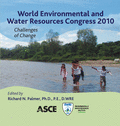Total Water Management: The New Paradigm for Urban Water Resources Planning
Publication: World Environmental and Water Resources Congress 2010: Challenges of Change
Abstract
There is a growing need for urban water managers to take a more holistic view of their water resource systems as population growth, urbanization, and current resource management practices put different stresses on local water resources and urban infrastructure. Total Water Management (TWM) is an approach that examines urban water systems in a more interconnected manner, focusing on reducing water demands, increasing water recycling and reuse, creating water supply assets from stormwater management, matching water quality to end-use needs, and achieving environmental goals through multi-purpose, multi-benefit infrastructure. The goal of this study was to communicate benefits of TWM to water management decision-makers and to aid in the development of management techniques that could be adopted in order to improve urban systems. The first element of the study was a comprehensive literature review that summarized TWM principles and real-world applications in the United States and abroad. The literature review was organized into different regions of the country in order to reflect geographic water management drivers and challenges. A systems model demonstrated how TWM alternatives would perform against traditional approaches to water management. The model simulates supply reliability, total lifecycle costs, water quality of receiving waters, and a number of other environmental indicators. Water Evaluation and Planning (WEAP) software, developed by the Stockholm Environment Institute, was used to develop the systems model. A case study for TWM model was based on The City of Los Angeles, CA and used real data, within real context. The city was divided into four demand areas, each with its own connections to surface, ground, and imported water supply sources, as well as connections to downstream wastewater treatment plants and receiving bodies. TWM strategies that were evaluated included increased water conservation, expanded recycling and reuse, greywater, stormwater recharge, and rainwater harvesting. The WEAP model simulated how integrated water supply, stormwater and water quality management can provide increased opportunities for achieving urban system goals that would not exist in single-purpose, traditional planning.
Get full access to this chapter
View all available purchase options and get full access to this chapter.
Information & Authors
Information
Published In
Copyright
© 2010 American Society of Civil Engineers.
History
Published online: Apr 26, 2012
Authors
Metrics & Citations
Metrics
Citations
Download citation
If you have the appropriate software installed, you can download article citation data to the citation manager of your choice. Simply select your manager software from the list below and click Download.
